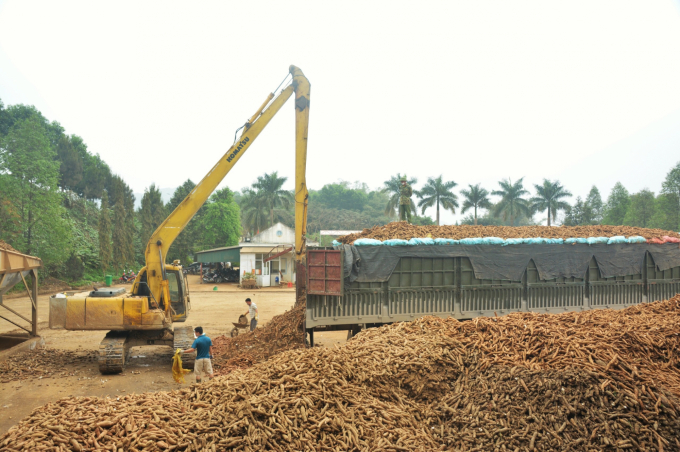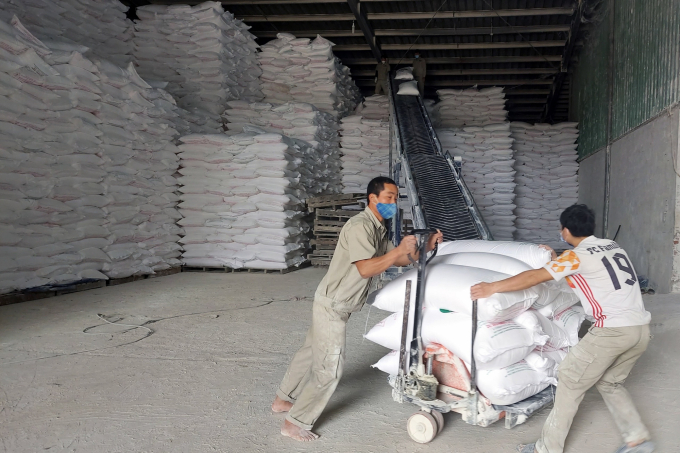May 24, 2025 | 16:26 GMT +7
May 24, 2025 | 16:26 GMT +7
Hotline: 0913.378.918
May 24, 2025 | 16:26 GMT +7
Hotline: 0913.378.918
Vietnam Agriculture News has received a complaint from the Vietnam Cassava Association on the General Department of Taxation's Official Letter 632 dated March 3, which is pushing cassava enterprises to the brink of the financial abyss. According to the letter, the General Department of Taxation directed its local branch to authenticate overseas customers, thereby halting tax refunds and collection of value-added tax arrears for cassava exporters.

Buying cassava at the factory. Photo: Vo Dung.
While there are various inconsistencies in the authorization of international consumers, the existing Vietnamese legislation on value-added tax refunds has no rule requiring the signature of a foreign customer on a document to qualify for a tax refund. Cassava exporters do not have the duty or capacity to check overseas partners before contracting.
According to Mr. Nghiem Minh Tien, vice head of the Vietnam Cassava Association, cassava, and cassava-based products are mostly exported to the Chinese market via border delivery, following Decree 14, which regulates border trade operations in detail. Accordingly, border trade operations are unique to two countries that share a land border, and the two countries' border import and export rules are separate, with no legal similarities.
Cassava exports in the form of border delivery are frequently uncontractual. This is especially true in China, where dealers frequently prefer oral negotiations and are unwilling to sign contracts with cassava exporters. From there, it is feasible to divide commodities to take advantage of preferential border exchanges and avoid having to declare them to the Chinese tax authorities.
Vietnamese counterparts need information on importers (individuals and organizations) to draft contracts for tax refund documents for Vietnamese firms that do not comply with Chinese import laws. Due to the incompatibility of import restrictions governing border exchanges of products, the Chinese partner may not be allowed to deal with the Vietnamese partner.
Tien further emphasized that calculating the quantity of exported cassava is possible since cassava enterprises must make complete and accurate declarations to Vietnam's Customs and get confirmation when transporting items across the border. Additionally, the revenues from cassava exports are transferred and recorded at the bank via documents. The tax administration may thus have comprehensive supervision over the number of items shipped by cassava firms.
Currently, the cassava industry is coping with a series of difficulties caused by prolonged Covid-19, the closure of Vietnam-China border gates, official export at a low price due to fierce competition from Thailand and Indonesia, an unresponsive container supply chain, and an incurable cassava mosaic virus, to the point where the stoppage of tax refunds and collection of value-added tax arrears has put the cassava industry in jeopardy.

Without VAT refunds, cassava enterprises are at risk of bankruptcy.
With sympathy for the cassava industry's difficulties, the Government Office issued Document No. 689/VPCP-KTTH on January 27, 2022, citing Deputy Prime Minister Le Minh Khai's directive to the Ministry of Finance to assume primary responsibility and coordinate with the Ministry of Industry and Trade and relevant agencies in studying and carefully considering the Cassava Association's recommendations and problems.
Mr. Tien stated that the state now has a favorable policy for cassava exports that includes a zero-tax rate and a value-added tax refund. Numerous firms were forced to spend money and borrow money from banks to purchase cassava for farmers while they awaited this tax refund. As a result, each enterprise must spend an average of approximately VND 2 billion per day during the harvest season to purchase 500-1000 tons of cassava tubers for farmers.
Failure to refund and collect debts will drive cassava firms to the verge of bankruptcy. As a result, cassava firms will be reluctant to export and purchase cassava from farmers; factories will be kept idle, incurring expenses; they will be unable to repay bank loans, and bankruptcy would certainly occur. On the other side, this will result in the default of 1.2 million cassava farmers, as no one would buy their cassava.
The General Department of Taxation's issuing of Official Letter No. 2495/TCT-TTKT on July 8, 2021, and Official Letter No. 632/TCT-TTKT on March 7, 2022, barring tax refunds and collection of tax arrears has crushed the cassava sector and pushed cassava firms to the brink of collapse.
Translated by Linh Linh

(VAN) In the tranquil wetlands of Van Long, there are quiet souls who guard the forests, nurture the waters, and oversee every bird and troop of langurs as protecting the essence of a living heritage.

(VAN) WWF, GIZ, IUCN, UNDP call for biodiversity conservation and sustainable development must be regarded as a unity in strategies for a green future.

(VAN) On celebration of International Day for Biological Diversity, Deputy Minister Nguyen Quoc Tri called for practical actions to address nature and biodiversity conservation.

(VAN) Dr. Hoang Thi Thanh Nhan – Deputy Director of the Nature and Biodiversity Conservation Agency – highlighted this on the International Day for Biological Diversity, May 22, 2025.
![Ho Chi Minh city adapts to climate change: [2] Accelerating action](https://t.ex-cdn.com/nongnghiepmoitruong.vn/608w/files/chiqk/2025/05/22/4024-4220-bien-doi-khi-hau-1-100626_766.jpg)
(VAN) Clearly recognizing the challenges posed by climate change, Ho Chi Minh city has swiftly shaped its policies and implemented practical solutions to adapt.

(VAN) Rice straw is no longer just a discarded byproduct, but it is becoming a green resource that helps farmers in the Mekong Delta reduce emissions and promote circular, sustainable agriculture.

(VAN) Other Effective Area-based Conservation Measures (OECMs) are solutions that contribute effectively to achieving the goals of the Kunming–Montreal Global Biodiversity Framework.